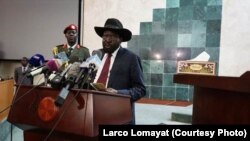A South Sudanese rebel spokesman said President Salva Kiir refused to sign Monday’s peace deal aimed at ending the country's 20-month civil war because he is afraid of power sharing.
According to mediators at the talks, Kiir did not sign the agreement and asked for 15 days to consult with his constituencies.
The decision is seen as the latest blow to peace talks sponsored by the East African bloc IGAD, the Intergovernmental Authority on Development, as well as several other countries, including the United States and China.
Welfare of people
Rebel spokesman Stephen Par Kuol said that although the agreement is not perfect, rebel leader and former Vice President Riek Machar signed it for the sake of peace and the welfare of the people of South Sudan.
“Out of concern for the lives of our people and the suffering they have been going through for almost two years now, our reaction was just to sign it," Par Kuol said.
"And we have seen that it is an agreement we don’t have all what we want in it, but it is an agreement that we can live with, compromising some of our political aspirations for the sake of peace and welfare of the people of South Sudan,” he said.
Par Kuol said the agreement addressed the formation of a transitional government of national unity.
“The document has provisions for the establishment of a transitional government of national unity mandated to accomplish among so many things, the writing of a permanent constitution and preparing the people of South Sudan for the next election to elect their own leaders,” he said.
Par Kuol said the agreement also provides for the creation of a “hybrid court” to ensure accountability for crimes committed during the 20-month long civil war.
Reform measures
“The transitional government of national unity is also mandated to introduce security sector reform in the country, formation of a new national army, and peace and reconciliation through something we call national healing process during the transitional period of 30 months," he said.
"That means, in 2½ years, we will prepare the people of South Sudan to write their own constitution,” Par Kuol added.
On the government's Twitter account, the South Sudanese president said, "Peace that cannot be sustained cannot be signed."
He also wrote, "If it is signed today and then tomorrow we go back to war, then what have we achieved?"
Par Kuol said Kiir did not sign the agreement because he wants to continue the war which he has “imposed” on the people of South Sudan.
'Watchful eye'
“Salva Kiir, under the watchful eye of the international community, has introduced a police state and by creating the current tension in Juba and in greater Equatoria State, he wants to expand the war because it is the war that will keep him in power," he said.
"With peace, the people of South Sudan will choose their own leaders, and I don’t think that they can choose Salva Kiir,” Par Kuol said.
Par Kuol said the rebels had thought Kiir would sign the agreement because he showed up in the room where it was to be signed. Before leaving South Sudan Sunday for Ethiopia, Kiir sacked four state governors by decree and replaced them with military generals.
The sacked governors are Major General Clement Wani Konga of Central Equatoria State, Colonel Joseph Bangasi Bakosoro of Western Equatoria State, Nyandeng Malek of Warrap State, and Major General Simon Kun Poch of Upper Nile State.
Par Kuol said the “wrongful dismissal” of what he calls elected governors is an indication Kiir wants to continue the war.






